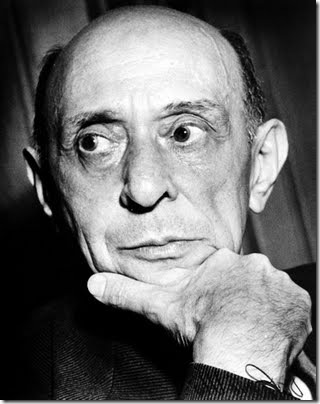As one of the Palm Beach Chamber Music Festival’s performers rightly said in her remarks from the stage, the name of Arnold Schoenberg is “box office poison” for a lot of people, but that really shouldn’t apply to his early string sextet, Verklärte Nacht.
This important, beautiful work was one of the major events of the programs in the first weekend of concerts presented in the chamber festival’s 20th anniversary summer, along with the most well-known of Mozart’s wind serenades and an attractive trifle by a French master of the flute.
The Schoenberg sextet, a moody evocation of a poem about two lovers walking in the moonlight, and the confession by the woman that she is pregnant with another man’s child, was set by the composer in a Wagnerian, shape-shifting style, with a simple falling minor scale setting the stage for music of emotional tumult that ends in major-key radiance.
In performance Sunday afternoon at the Crest Theatre in Delray Beach, the sextet came off rather drily, though clearly the players on stage were trying to emote as best they could. Intonation in the numerous unison octave passages was not what it should have been, which is problematic in music written in the thick, always-doubled fashion of late Romanticism.
And while the players handled their parts ably enough, the music didn’t have enough febrility, enough nervous emotion. Even the very beginning, with its deep, quiet octaves in the tonic, was too precise and pointed: Those low D’s beat time rather than summoned mystery. The beauty of this piece in addition to the quality of the themes and harmonies is its sense of feelings in near-manic flux; it needs to shimmer along with the dark landscape, lit now by the moon, then by nobility of action as the man of the couple accepts the child-to-be as his own.
Each change of mood needs to be starkly underlined, brought out in clear contrast to the one that came before, so that the journey to the major key at the end sounds like arrival. But this reading, while pleasant and competently played, was too careful and prosaic to be magical, and by doing so it fell short of the music’s point.
The concert opened with Médailles Antiques, a two-movement work by the French flutist and conductor Philippe Gaubert (1879-1941). The flutist was Beth Larsen, substituting for an absent Karen Dixon; she was joined by pianist Roberta Rust and violinist Mei-Mei Luo. This is expertly made, if not particularly distinctive, music, but it shows off each instrument well.
Rust played with force and bigness throughout, and Larsen’s tone was full and sweet. Luo played with her usual intensity, and while on the surface that might seem the wrong prescription for lighthearted French music, it actually worked rather well, bringing out the slippery harmonies and energy of the piece to good effect. The second of the two movements, Danses, was somewhat reminiscent of Chabrier, and the three musicians played it with high spirits and engaging athleticism.
The second half of the concert was devoted to Mozart’s Serenade (No. 10 in B-flat, K. 361) for 13 winds, known as the Gran Partita. The festival took the trouble to bring in two basset horns for the performance, a laudable gesture of fealty to the score, which an old tradition assigns to celebratory music for Mozart’s wedding in 1782.
All 14 musicians (including double bassist Jason Lindsay) blended nicely, playing with a fat, round sound, but not one that was overwhelming. It was, however, an approach overall that was somewhat too dynamically limited, and that may have been because the musicians played the piece without a conductor.
The famed third movement (beloved from the scene in the movie Amadeus when Salieri first learns who Mozart is), for instance, was a shade too heavy and too fast, which cost it some of the beauty of the Handelian solo oboe gesture with which it opens. Similarly, in the fourth movement Minuetto, with its two trios, there was much to admire in the spiffy solo work (particularly the bassoon in the second trio), but the music also had a sameness to its dynamic level that could have been easily altered with a good conductorial hand.
The bravura ending, which always brings cheers, did so Sunday afternoon as well, and in the important respects of technique, blend and harmony with Classical style, this was a strong, enjoyable reading of a monument of wind literature. It could have used more subtlety, though, to bring out all of Mozart’s light and shade, and for that it would have needed a director.
The Palm Beach Chamber Music Festival offers its second concert of the summer at 8 p.m. Friday at Persson Hall on the campus of Palm Beach Atlantic University in West Palm Beach, at 8 p.m. Saturday at the Eissey Campus Theatre in Palm Beach Gardens and at 2 p.m. Sunday at the Crest Theatre in Delray Beach. The program features Peter Warlock’s Capriol Suite, arranged for woodwind quintet by John McDonough, Eugene Bozza’s Four Movements for Wind Septet, and the Schubert String Quartet No. 14 in D minor, D. 810, known as the Death and the Maiden Quartet. Tickets are $25, and a four-weekend ticket can be had for $85. Call 330-6874, visit www.pbcmf.org, or buy them at the door.
